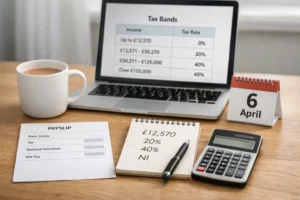Her Majesty’s Revenue and Customs (HMRC) plays a crucial role in the UK’s tax landscape, overseeing tax collection and enforcing tax laws. As part of its digital transformation, HMRC introduced online services that made managing taxes more convenient for individuals and businesses alike. These online accounts and tax filing services have been an essential tool for many taxpayers, offering an easy way to submit tax returns, track payments, and manage tax records.
However, on 1 April 2026, HMRC will officially end its online accounts and tax filing service. This significant change will have far-reaching consequences for individuals, small businesses, and accountants across the UK. In this article, we will explore the reasons behind this move, its impact on various stakeholders, and the alternatives available to ensure a smooth transition.
Table of Contents
ToggleBackground: The Rise of HMRC’s Online Services
HMRC’s online services began to take shape in the early 2000s, with the introduction of online self-assessment tax returns. This marked the beginning of a shift away from paper-based filing to digital systems. Over the years, HMRC’s online services expanded to cover VAT returns, PAYE submissions, Corporation Tax filings, and National Insurance contributions, ultimately becoming the central hub for managing UK tax obligations.
In 2016, HMRC launched the Making Tax Digital (MTD) programme, which required businesses to keep digital records and file VAT returns online. MTD was part of a broader strategy to modernise the UK’s tax system and make tax management more efficient and error-free.
By 2025, over 10 million individuals and thousands of businesses had adopted HMRC’s online services, appreciating the convenience, accuracy, and real-time access to tax information. However, despite the success of the digital shift, the end of the current online services was announced in March 2025, with the official phase-out scheduled for 1 April 2026.
Why HMRC Is Ending Online Accounts and Tax Filing Service
HMRC has stated that the current online accounts and tax filing system has become outdated. As technology evolves, HMRC has acknowledged the need to upgrade its infrastructure to offer more secure, modern, and efficient services to taxpayers. Several factors contribute to this decision:
- Outdated Systems: The existing platform has reached the end of its lifecycle, and maintaining it is no longer efficient. HMRC believes that a more integrated, user-friendly system will better serve UK taxpayers.
- Security and Data Protection: With the increasing sophistication of cyber threats, HMRC has emphasised the importance of upgrading its digital infrastructure to safeguard taxpayer data.
- Improved User Experience: HMRC aims to enhance the user experience by offering a more streamlined and secure tax filing process. The new system is expected to centralise tax management, making it easier for individuals and businesses to handle their tax affairs.
Impact of the Change
The discontinuation of HMRC’s online accounts and tax filing service will impact various groups, from individual taxpayers to accountants managing clients’ tax submissions. Below, we look at how different stakeholders will be affected:
Impact on Individuals
For individuals, particularly those who regularly file self-assessment tax returns, the end of HMRC’s online service will represent a significant change. While HMRC has promised new alternatives, the transition may cause confusion for those who are accustomed to the simplicity and accessibility of the current system.
Key Concerns for Individuals:
- Loss of Convenience: The ability to submit tax returns quickly and efficiently online will be lost. Individuals may face delays or increased paperwork as they transition to new systems.
- Complexity: Those less familiar with technology may find it difficult to adapt to new methods of filing, adding complexity to an already stressful process.
Impact on Small Businesses
Small businesses that have used HMRC’s online services to file VAT, Corporation Tax, and PAYE returns will also be impacted. These businesses will need to explore new platforms to meet their tax obligations.
Key Concerns for Small Businesses:
- Increased Administrative Burden: Small businesses will likely face additional administrative work as they transition to alternative systems. This may include using third-party platforms or hiring accountants to help manage their filings.
- Cost Implications: There may be an increased cost for businesses that need to invest in new tax management software or professional services to ensure compliance.
Impact on Accountants
Accountants who manage multiple clients’ tax filings will also feel the effects of HMRC ending its online services. Many accountants have become accustomed to using the current system to streamline their workflows and ensure accurate, timely submissions.
Key Concerns for Accountants:
- Increased Workload: Accountants will need to help clients transition to new systems, which may require additional time and resources.
- Software Integration: Many accounting software solutions integrate directly with HMRC’s online system. The discontinuation of this service may disrupt accountants’ workflows, requiring them to adopt new solutions or adjust existing ones.
What Will Replace HMRC’s Online Services?
While HMRC is ending its current online services, the agency has committed to providing a new digital tax account platform. This will serve as a central hub for managing all tax affairs, including self-assessment, VAT, PAYE, and National Insurance contributions. The new system will offer more integrated features and improved security, but it remains unclear when it will fully replace the existing online services.
Third-Party Platforms
As HMRC transitions away from its current system, third-party platforms like Xero, QuickBooks, and FreeAgent will play an increasingly important role. These platforms already integrate with HMRC’s system, allowing users to file taxes, manage records, and track payments. In the absence of HMRC’s online services, these platforms will likely become essential for businesses and individuals alike.
Paper-Based Filing
While digital platforms will be encouraged, individuals and businesses that are unable to transition to new digital systems may still be able to file taxes via paper forms. However, this method is less efficient and will likely result in delays in processing and refunds.
How to Prepare for the Transition
The full phase-out of HMRC’s online accounts and tax filing service is scheduled for 1 April 2026, but the transition will begin much earlier. It’s important to take steps now to ensure a smooth shift. Here are some recommendations:
- Stay Updated: Monitor HMRC’s official announcements regarding the new digital tax account system. Be sure to know important dates, including the final date of the current service on 1 April 2026.
- Explore Alternative Solutions: Research third-party tax platforms like Xero, QuickBooks, and FreeAgent. These platforms may provide the tools you need to file taxes and manage your tax records going forward.
- Consult with a Professional: If you’re uncertain about how to manage the transition, it may be wise to consult with an accountant or tax advisor. They can guide you through the process and help you stay compliant.
- Prepare Early: As the transition period gets underway, start preparing your tax filings earlier than usual to avoid last-minute complications. This will give you extra time to adjust to new systems and ensure everything is submitted on time.
FAQ
Here are some questions people want to know about HMRC Ending Online Accounts and Tax Filing Service
When will HMRC’s online accounts and tax filing service be fully closed?
HMRC’s online accounts and tax filing service will be completely phased out by 1 April 2026.
Why is HMRC ending its online tax filing services?
HMRC is discontinuing its online services due to outdated systems that no longer meet security and functionality requirements. The new platform aims to provide a more secure and integrated digital tax experience.
How will this change affect individuals?
Individuals who file self-assessment tax returns online will need to transition to new platforms or methods for filing. This may lead to increased complexity and the loss of the current system’s convenience.
What alternatives will be available for filing taxes after the transition?
HMRC plans to introduce new digital tax accounts to manage tax filings. Additionally, third-party platforms like Xero, QuickBooks, and FreeAgent will become key alternatives for filing taxes and managing records.
How can I prepare for the end of HMRC’s online services?
Stay informed about the changes, explore third-party solutions, and consult with a tax professional if needed. Start filing taxes earlier to avoid complications as the transition takes place.
Conclusion
The end of HMRC’s online accounts and tax filing service, set to take effect on 1 April 2026, marks a significant change for UK taxpayers. While this transition may cause some disruption, it also presents an opportunity for a more secure, integrated, and user-friendly tax filing system.
By staying informed, exploring alternatives, and preparing ahead of time, you can ensure that you continue to meet your tax obligations without unnecessary complications. The introduction of new digital platforms and third-party solutions will help make the transition smoother, but it’s essential to stay proactive and be ready for the change.





